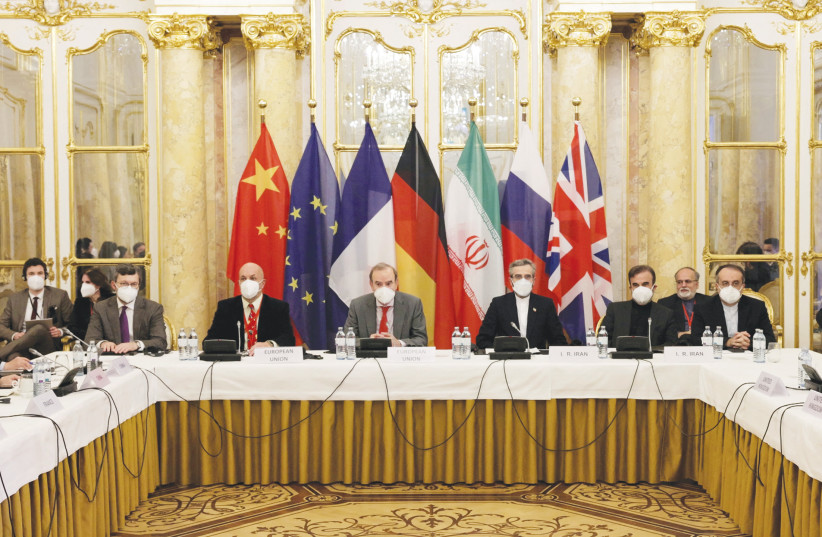Last February, Prime Minister Naftali Bennett and opposition leader Benjamin Netanyahu addressed leaders from the Conference of Presidents of Major American Jewish Organizations. Both politicians, while differing stylistically, focused their remarks on the potential revival of the Joint Comprehensive Plan of Action (JCPOA), known as the Iran nuclear deal. Under the proposed agreement, Iran will be able to advance its uranium enrichment program, potentially cutting its time to reach enough nuclear fuel for one bomb to six months. Israel is also understandably concerned with reports that the United States is considering removing Iran’s Islamic Revolutionary Guard Corps (IRGC) from the Foreign Terrorist Organizations (FTO) list. The current suspension of nuclear negotiations in Vienna is eliciting reactions ranging from Iran’s Foreign Minister Saeed Khatibzadeh stating that a deal is within reach” to US Secretary of State Antony Blinken claiming again that time was running out to reach an agreement between Iran and the P5+1 countries tasked with reviving the accord.
The talks’ uncertain fate suggests that now would be a wise moment for pro-Israel and Jewish groups to redouble their efforts and convince the Biden administration to hold Iran accountable for stonewalling negotiations and accelerating its clandestine nuclear enrichment activities. The uncomfortable truth is that Russia’s invasion of Ukraine and the humanitarian toll inflicted upon Ukrainian citizens is detracting attention away from events in Vienna. The Conference of Presidents recently spearheaded a letter to President Joe Biden, signed by 28 major Jewish groups, urging that the US to accept refugees fleeing from Ukraine without delay.
Yet, even prior to the Ukrainian war, Jewish institutional behavior underscored an establishment fatigued and indifferent to specifics surrounding the accord. Compared to protests surrounding the Iran Nuclear Deal in 2015, today’s apathy absolves the Biden administration from attempts to mollify Jewish communal concerns. As a result, US negotiators retain the latitude to reach an agreement proving to be far more dangerous for Israel and its allies in the region.
While not specifically a Jewish institution, the American Israel Public Affairs Committee (AIPAC), a US-based pro-Israel lobby, was the most-high profile organization to display its opposition to the JCPOA, back in 2015. Despite AIPAC spending millions of dollars on TV ads and grassroots lobbying to block the accord, the overwhelming majority of congressional Democrats backed then-President Barack Obama and prevented Republican lawmakers from blocking the deal.
Today, rather than expend additional resources, AIPAC has taken a decidedly low-key approach to opposing the proposed new nuclear deal. Aside from issuing a memo requesting that Congress conduct oversight and review any new agreement, the six agenda items listed on AIPAC’s website revolve around topics more palatable to mainstream lawmakers, such as supporting Israeli and American Veterans and opposing restrictions on aid to Israel.

IT BEARS mentioning that AIPAC is not alone in altering its approach to repudiating the Iran Nuclear Deal. In 2015, the Jewish Federations in Los Angeles, New York and Boston released statements strongly renouncing or voicing serious concerns related to the passage of the JCPOA. Years later, said establishments are centered on raising awareness and funds to assist Ukrainian citizens, but have yet to distribute a meaningful position on a potential new nuclear accord. Other prominent Jewish organizations, such as the American Jewish Committee (AJC) and the Anti-Defamation League (ADL), also remain reluctant to lobby against returning to the flawed deal they once opposed.
In 2015, hundreds of rabbis and Jewish leaders from across the religious spectrum joined thousands of protesters on Capitol Hill, demanding that Congress reject the Iran deal. Today, the muffled calls from American synagogues and their advocacy arms decrying the US administration’s Iranian appeasement campaign is a direct result of dwindling synagogue attendance during the COVID-19 pandemic converging with Russia’s invasion of Ukraine.
While congregants digesting a sermon invoking the specifics of an Iran nuclear deal may prove mundane or frightening, Ukraine’s heartbreak is uniting liberals, conservatives, celebrities, and Jews from all political and religious persuasions. And as synagogues begin to fill up again, Jewish leaders inevitably understand the risk associated with criticizing a president that the majority of their congregation likely favored during the 2020 presidential election.
In fairness, a small yet growing chorus of Democrat lawmakers has publicly addressed the Biden administration’s misguided approach to talks in Vienna. Yet, the current policy set in place by Israel advocacy organizations to sideline the Iran issue is attempting to preserve a performative semblance of bipartisanship related to Israel, while allowing space to address a current crisis that unites, rather than divides, their respective Jewish communities.
A Pew Research Center study on Jewish Americans released last year found that almost 40% of Jews polled ages 18 to 29 do not identify with a branch of Judaism. More concerning is that approximately sixty percent of Jews who are unaffiliated denominationally report that they are either “not too” or “not at all” attached to Israel. Many US Jewish organizations seeking to attract a younger and progressive cohort are inadvertently deepening the fissure between the US and Israel, while gambling on Israel’s security posture. If left unchecked, the unfolding paradigm will be what Gil Troy and Natan Sharansky refer to as the “disentangling of Judaism from Jewish nationalism.”
Some believe that Bennett’s outsize focus on mediating between Ukraine’s President Volodymyr Zelensky and Russia’s President Vladimir Putin contributed to his coalition crisis back at home. Similarly, as US Jewish groups underestimate the enormity of resuscitating the JCPOA, the insertion of catastrophic compromises can slip under the Jewish community’s radar. The perpetuation of American Jewry relies upon a solid attachment to Israel. An institutional indifference to the Iran nuclear deal imperils the health of US Jewry’s connection to the Jewish homeland, while also paving the way for an agreement that places millions of Jews in the nuclear crosshairs of a terrorist regime.
The author is a writer who resides in New York. Her work has appeared in The American Spectator, The Algemeiner and Israel Hayom.
